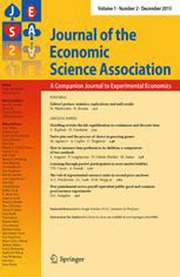Crossref Citations
This article has been cited by the following publications. This list is generated based on data provided by
Crossref.
Candreva, Christopher
2019.
Multi-Media Learning and Experimental Economics Instructions.
SSRN Electronic Journal ,
Cartwright, Edward
and
Ramalingam, Abhijit
2019.
Framing effects in public good games: Choices or externalities?.
Economics Letters,
Vol. 179,
Issue. ,
p.
42.
Boosey, Luke
Mark Isaac, R.
Norton, Douglas
and
Stinn, Joseph
2020.
Cooperation, contributor types, and control questions.
Journal of Behavioral and Experimental Economics,
Vol. 85,
Issue. ,
p.
101489.
Kleinlercher, Daniel
and
Stöckl, Thomas
2021.
Thou shalt not trade—An analysis of the violations of no-trade predictions in experimental asset markets.
Journal of Behavioral and Experimental Finance,
Vol. 32,
Issue. ,
p.
100590.
Schmidt, Dominik
and
Stöckl, Thomas
2021.
Asset Market Experiments with Diverse Information.
SSRN Electronic Journal,
Chen, Roy
Chen, Yan
and
Riyanto, Yohanes E.
2021.
Best practices in replication: a case study of common information in coordination games.
Experimental Economics,
Vol. 24,
Issue. 1,
p.
2.
Petersen, Luba
and
Rholes, Ryan
2022.
Macroeconomic expectations, central bank communication, and background uncertainty: A COVID-19 laboratory experiment.
Journal of Economic Dynamics and Control,
Vol. 143,
Issue. ,
p.
104460.
Petersen, Luba
and
Rholes, Ryan
2022.
Macroeconomic Expectations, Central Bank Communication, and Background Uncertainty: A COVID-19 Laboratory Experiment.
SSRN Electronic Journal ,
Pulickal, Anuvinda
and
Chakravarty, Sujoy
2022.
Subject Confusion and Task Non-Completion: Methodological Insights from an Artefactual Field Experiment in India.
SSRN Electronic Journal ,
Pulickal, Anuvinda
and
Chakravarty, Sujoy
2023.
Subject confusion and task non-completion: Methodological insights from an artefactual field experiment with adolescents in India.
Journal of Behavioral and Experimental Economics,
Vol. 103,
Issue. ,
p.
101986.
Merl, Robert
Palan, Stefan
Schmidt, Dominik
and
Stöckl, Thomas
2023.
Insider trading regulation and trader migration.
Journal of Financial Markets,
Vol. 66,
Issue. ,
p.
100839.
Brosnan, Sarah F.
and
Wilson, Bart J.
2023.
Comparative economics: how studying other primates helps us better understand the evolution of our own economic decision making.
Philosophical Transactions of the Royal Society B: Biological Sciences,
Vol. 378,
Issue. 1876,
Merl, Robert
Stöckl, Thomas
and
Palan, Stefan
2023.
Insider trading regulation and shorting constraints. Evaluating the joint effects of two market interventions..
Journal of Banking & Finance,
Vol. 154,
Issue. ,
p.
106490.
Fink, Josef
Palan, Stefan
and
Theissen, Erik
2024.
Earnings Autocorrelation and the Post-Earnings-Announcement Drift: Experimental Evidence.
Journal of Financial and Quantitative Analysis,
Vol. 59,
Issue. 6,
p.
2799.

